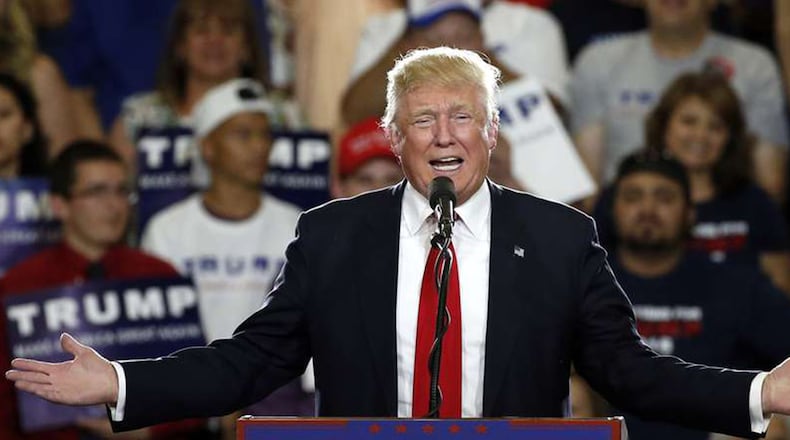ELECTION COVERAGE
Like our Ohio Politics Facebook page to get the latest news from the campaign trail.
Just four years ago after Republican presidential nominee Mitt Romney won 27 percent of the Hispanic vote, GOP officials fear Donald Trump has so alienated the nation’s fastest growing voting bloc that he will pull even fewer votes and threaten his chance to win the presidency.
Not only did Trump last week criticize an American-born federal judge whose parents came from Mexico, but he has vowed to deport millions of undocumented immigrants and curb illegal immigration by building a wall along the Mexican border.
—-
On Twitter: Join the discussion on @Ohio_Politics
On Facebook: Like our Ohio Politics Facebook page and join the discussion and sound off on the issues.
Who do I agree with?Answer some questions and find out which candidate agrees with you
—-
Republicans who pleaded for a more aggressive effort this year to win Hispanic voters are appalled at Trump’s rhetoric, saying he will not only drive Hispanic voters toward presumptive Democratic presidential nominee Hillary Clinton, but cripple Republican candidates in states with large Hispanic populations such as Arizona and Nevada.
“What’s happening in this election cycle is heart-breaking,” said Rudy Fernandez, a White House adviser to former President George W. Bush who won 44 percent of the Hispanic vote during his 2004 re-election campaign. “I’ll be surprised if he gets 20 percent of the Latino vote.”
Whit Ayres, a Republican pollster in suburban Washington who has written extensively on the changing demographics of the electorate, said Trump is “obviously creating a higher mountain by the day the more he antagonizes Hispanics and other minorities, and the more he antagonizes women.”
“He has apparently decided he can win a national election by running up votes of white men to truly historic levels,” said Ayres, author of the book “2016 and Beyond – How Republicans can elect a president in the New America.”
Trump last week provoked an intense controversy and sharp criticism from House Speaker Paul Ryan, R-Wis., when he claimed U.S. District Judge Gonzalo Curiel of California was biased against him because the New York real estate magnate wants to build a wall along the border. Curiel is presiding over a civil lawsuit involving people who claimed they were defrauded by the now-closed Trump University.
Even though Trump later claimed his remarks about the judge were “misconstrued,” he said Sunday on CBS’ Face The Nation that he saw “hundreds of signs – Latinos for Trump,” at one of his rallies last weekend.
“And you know what?” Trump said. “They are here legally. They don’t want their homes taken away. They don’t want their job taken away. They like what I’m doing.”
Trump’s optimism is contradicted by a Gallup poll released in March which shows that 12 percent of Hispanics have a favorable view of him while 77 percent hold an unfavorable opinion. By contrast, 59 percent of Hispanics have a favorable opinion of Clinton.
A report released in February by the Pew Research Center predicted Hispanics will make up 12 percent of the electorate in November compared to just 7 percent in the 2000 presidential election. By contrast, whites will comprise 69 percent of the electorate this year, a steep drop from 78 percent in 2000.
Bush was re-elected in 2004 in part because he gained such strong support from Hispanics. Bush’s advisers courted the Hispanic vote, including an effort to overhaul the nation’s immigration laws and provide a path to citizenship for millions of undocumented immigrants.
But immigration reform provoked a deep split inside the Republican Party with many conservatives denouncing it as “amnesty.” By 2012, Romney offended millions of Hispanics when he suggested undocumented immigrants self deport.
“Here we are in 2016 and the party looks worse today than it did in 2012, in terms of inclusion,” said Al Cardenas, a Cuban-American Republican lobbyist who supported former Florida Gov. Jeb Bush’s presidential campaign. “It’s easy to say we have become the party of exclusion as opposed to inclusion.”
To Trump backers, the picture is not nearly so bleak. They point out that key states such as Ohio, Michigan and Pennsylvania do not have large Hispanic populations. While a sizable number of Hispanics live in California, Florida and Texas, Trump supporters maintain he will easily carry Texas.
“There is a simplistic notion that Hispanics are monolithic,” said Barry Bennett, a senior adviser to the Trump campaign. “They’re not. You can’t appeal to all of them because they are very diverse. They are Republicans, they are Democrats, they are small businesses people. We will be talking to the conservatives — which is a pretty big chunk.”
Yet while acknowledging Hispanic voters care about many of the same issues as white voters, such as the economy and national security, Fernandez warned Republicans “could have Latino voters agree with us on all our issues. But if you want to deport their grandmother, they are not going to be with you.”
About the Author
